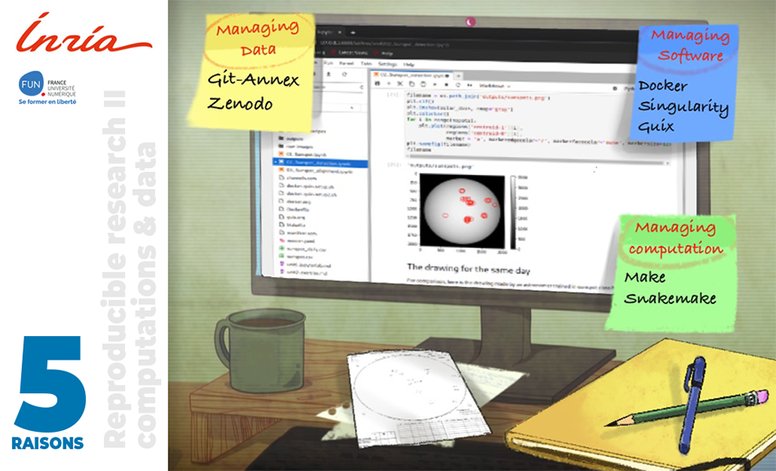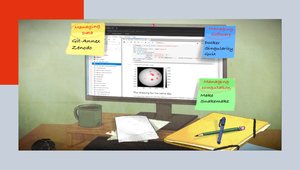5 reasons to follow the MOOC Reproducible Research II: Practices and tools for managing computations and data
Categories
About the course05/22/2025

Whether you are a doctoral student, researcher, master's student, teacher or engineer, this course will enable you to answer the main questions raised by the processing of large datasets, whether in terms of data management, the software environment or the complexity of the calculations.
Ready to take on the challenges of science? Discover 5 reasons to enrol in our new MOOC Reproducible Research II: Practices and tools for managing computations and data!
Reason #1: Enhance the reproducibility of your research
Reproducible research is a major challenge in doing science. This MOOC will teach you how to improve your practices, ensuring reliable and reproducible results. You will learn to manage and process large amounts of data, as well as perform complex computations while controlling your software environment.
Reason #2: Follow a complementary and coherent course
Following the success of our first MOOC Reproducible research: Methodological principles for a transparent science, this new course focuses on large datasets and complex computations. Both MOOCs complement each other perfectly, offering a comprehensive and coherent training program on computational reproducibility.
Reason #3: Benefit from expert experience
In this interdisciplinary MOOC, you will benefit from the expertise of Arnaud Legrand, computer science researcher (CNRS/LIG, Inria, UGA), Christophe Pouzat, neurophysiologist (CNRS/IRMA, Univ. of Strasbourg), Konrad Hinsen, Biophysicist (CNRS, Centre for Molecular Biophysics, and Synchtrotron SOLEIL) as well as Matthieu Simonin, Ludovic Courtès et Kim Tâm Huynh, research engineers at Inria, who have been deeply involved in reproducible research challenges for many years. They will show you in particular how to use formats like JSON, FITS, and HDF5, platforms like Zenodo and Software Heritage, and tools such as git-annex,Docker, Singularity, Guix, make, and Snakemake.
Reason #4: Enjoy flexibility and accessibility
The MOOC will be available in English on the FUN platform from May 5, 2025 to September 10, 2025. You can study at your own pace, with an estimated time commitment of 35 hours. Future sessions will also be available.
Upon completion, you can earn an Open Badge certifying your new skills.
Reason #5: Participate in hands-on sessions with open-source tools
This MOOC stands out with numerous hands-on sessions using open-source tools. You will have the opportunity to apply what you’ve learned, making your learning experience both effective and practical. Most exercises are conducted in a JupyterLab environment provided to each learner of this MOOC.
This course is offered by Inria Learning Lab, with the support of the French National Fund for Open Science.
To register now and learn more, click here.
Inria
Enrollment : From March 20, 2025 to September 3, 2025
Course : From May 5, 2025 to September 10, 2025
Related posts
5 raisons de s’inscrire au MOOC « Éducation inclusive : ressources numériques adaptées pour la classe »
Categories
About the course5 raisons de s’inscrire au MOOC «Les précarités alimentaires»
Categories
About the course5 raisons de suivre la formation «Systèmes énergétiques - Objectif bas carbone»
Categories
About the course




